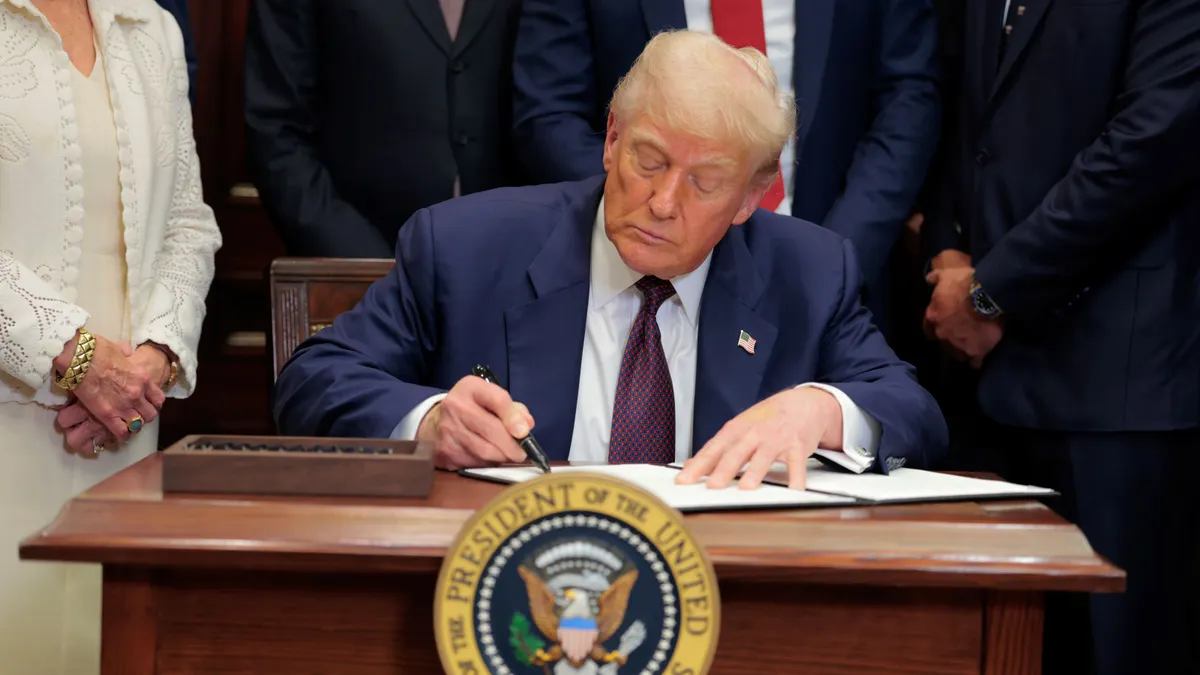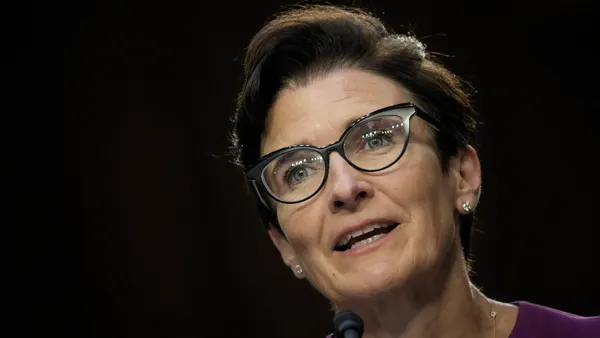President Donald Trump on Wednesday scrapped a July 2021 executive order that sought to promote competition and encourage federal regulators to apply more scrutiny to potential mergers and acquisitions.
It’s the latest reversal of a Biden-era order by the Trump administration, which, in turn, has heightened expectations around an increase in bank M&A activity.
Joe Silvia, a Chicago-based partner at law firm Duane Morris, said the EO being revoked is “another support mechanism for increased M&A.”
“I don’t know that it’ll make a material difference, but I think it’s another example of him signaling to the market that they are open for business, basically,” he said.
The 2021 executive order had encouraged federal regulators and the Justice Department to take a closer look at mergers, in an effort to address “excessive consolidation.” The Office of the Comptroller of the Currency and Federal Deposit Insurance Corp., during former President Joe Biden’s tenure, went on to issue rules or policy statements aimed at increasing scrutiny around potential deals.
But the second Trump administration, widely viewed as more business-friendly, has been quick to knock those down. In June, after the Senate and House had voted to nullify the rule, Trump signed a measure that overturned a 2024 OCC rule banning expedited merger reviews.
And the FDIC in May rescinded a statement of policy issued last year that would have more closely scrutinized mergers creating banks with more than $100 billion in assets. Acting Chair Travis Hill has said he’s intent on processing bank merger applications more quickly.
Federal Trade Commission Chairman Andrew N. Ferguson said in a Thursday statement the now-revoked order “encouraged top-down competition regulations, and established a flawed philosophical underpinning for the Biden-Harris Administration’s undue hostility toward mergers and acquisitions.”
GOP lawmakers often bemoaned the amount of time Biden-era regulators spent considering bank mergers and acquisitions, and Republicans have billed regulatory pivots as helping smaller banks, in particular, grow and compete. Even though merger review processes during Biden’s tenure were longer than during Trump’s first administration, most bank deals eventually were approved.
Despite the order being rolled back, monopolistic and competitive considerations around transactions won’t disappear, noted Daniel Goerlich, the U.S. banking and capital markets deals leader at PwC. A confluence of things go into deal-making, and “it’s all going to be dependent on what type of transaction a bank takes on,” he said.
Just over 100 U.S. bank deals have been announced this year to date, according to S&P Global Market Intelligence. The 2024 total was 126.
Twenty-six U.S. bank deals were announced in July, the highest monthly tally since June 2021, the firm said. And the aggregate deal value of $10.83 billion was the largest since December 2021. Contributing to that was last month’s proposed merger of equals between Nashville, Tennessee-based Pinnacle and Columbus, Georgia-based Synovus.
That deal will likely face plenty of scrutiny, even if the merger review timeline is shorter than it might have been under the Biden administration, Silvia noted. He’s eager to see what the public reaction to the deal will be, since larger deals tend to draw more comments and those can sideline a potential timeframe.
If the Pinnacle-Synovus deal sees a shorter regulatory review timeframe, it could signal to the market that regulators are moving faster and are more open to such deals, Silvia said. While the larger Capital One-Discover deal took 14 months for the Fed and OCC to approve, Pinnacle and Synovus are betting on an eight-month timeline.
Even with smoother regulatory approval processes, “you still have some questionable components for creating deal structures and transaction values,” as it relates to interest rates and market volatility, Silvia said.
“There’s a lot of support for increased M&A activity,” Silvia said, but “financial modeling can be up in the air sometimes.”












